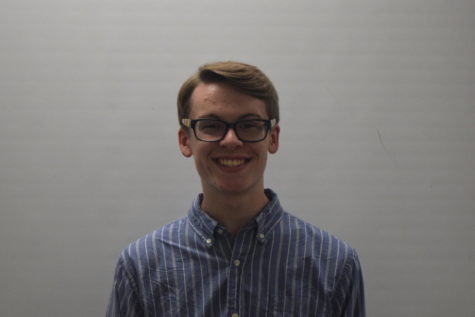Speech and Debate Begins
The Forensics Speech and Debate season has started once again!
For those of you that don’t know, Forensics Speech and Debate is a compilation of various speech, performing, and debate events that students compete in at both state and national levels. As a three-year member of the team, I will try to shed some light on what exactly goes on in Forensics, how it works, and the benefits of it. As we get later into the year, other clubs and activities will be highlighted as well.
In Forensics Speech and Debate, students will have the opportunity to compete in eleven different main events, split up into two different categories: Speech and Debate (as the name implies). The Speech events involve public speaking or students acting out certain pieces from various scripts as they interpret it. Then, as Debate suggests, students will debate each other. The main events include POI, Duo, Poetry, DI, HI, USX, IX, OO, Informative, PF, and LD (I know these are a lot of intimidating acronyms). Aside from the main events that teams primarily compete in here locally in the Rio Grande region of Colorado, Congressional Debate and World Schools Debate are also offered to compete in, but not as often as the other main events. Students will be able to compete in any of these events throughout the Forensics Speech and Debate season:
Speech:
- POI: Program Oral Interpretation – A dramatic reading from a combination of poetry, prose, and drama, centered around a single theme, ten minutes long.
- Duo Interpretation: A dramatic or humorous, memorized reading from either a dramatic or humorous source, performed by two people, ten minutes long.
- Poetry Interpretation: A dramatic memorized reading from a single or collection of poetic sources, ten minutes long.
- DI: Drama Interpretation – A dramatic, memorized reading from a dramatic source, ten minutes long.
- HI: Humorous Interpretation – A dramatic, and preferably humorous, memorized reading from a humorous source, ten minutes long.
- Extemporaneous Speaking (Extemp): Extemp is a speech event that revolves wholly around current events. Students will be given three different questions relating to current events, they can pick one, and then they will have 30 minutes to prepare about a seven-minute speech analyzing and answering the question. Having a thorough background knowledge of politics and news definitely helps!
- USX: United States Extemp – This version of extemp solely revolves around current events in the United States of America and U.S. foreign relations.
- IX: International Extemp – Similarly, this version of extemp revolves around international events and relations.
- OO: Original Oratory – Orators write and memorize an original, ten-minute persuasive speech on a topic of their choosing. This speech includes analysis of the chosen topic and a call to action on the topic.
- Informative: Informative Speaking – Very similar to OO, students write and memorize an original, ten-minute informative speech on a topic of their choosing. However, this speech does not require a call to action and merely informs the listeners on the chosen topic.
Debate:
- PF: Public Forum Debate – PF is a partner debate (2v2) that generally revolves more around the political side of current, controversial events. In this style of debate, students and their partner switch off on speeches, working in tandem to defeat the other two opponents. Having knowledge of current events and history helps with being successful in this event.
- LD: Lincoln-Douglas Debate – LD is a solo debate (1v1) that revolves around the philosophical side of similar current, controversial events as seen in Public Forum Debate. This style of debate includes discussing the morals and values behind each of the topics. Just like Public Forum, having knowledge of current events and history helps with being successful in this event.
Miscellaneous:
- Congressional Debate: Students participate in a mock congress and debate bills that all revolve around current and controversial topics.
- World Schools Debate: This event has only recently been offered in America, but has been used in other countries around the world for years. This style of debate is unique in its own right, but can best be described as a mixture between Extemporaneous Speaking and Public Forum Debate, as there are multiple, lengthy speeches and each team will have three members that work together in a round.
Come tournament time, usually on Saturdays, students will compete against other students from different Colorado schools for awards. However, the rounds of competition do not include speaking in front of a room full of people. The actual rounds merely include speaking in front of a judge, who will score the round, and the other competitors. Contrary to what many people think, Forensics Speech and Debate is not public speaking in front of dozens of people, although there is occasionally some of that (but rarely). There is public speaking, that is what the team is all about, but it is not as horrifying as people assume.
As nice as winning awards is, I have come to find over my three years on the team that winning is not the most rewarding thing. For some, awards may be the only reason they are motivated to do anything. But I think as many will find, and have found, the personal benefits by far outweigh the material goods. Forensics Speech and Debate as a whole offer students a way to practice and become proficient in public speaking. Public speaking is the number one fear in America, more so than death itself. Yet, everyone will be required to publicly speak at some point in his or her life or interact with others on a professional level. So actually practicing and facing that fear can be more rewarding than anything else. On the academic side of things, participating in Speech and Debate will indirectly improve one’s critical thinking ability and overall flow of argumentation, skills used in every academic paper and assignment. Due to these benefits, colleges are more likely to accept students who have competed in Forensics Speech and Debate.
But possibly most importantly, the Forensics Speech and Debate team here at Air Academy is a family. Joining the team means joining a close-knit group of incredibly talented individuals. The people on the team may be different and a little weird in good ways (but then again, who isn’t), but you will be hard-pressed to find any other group of people as close, caring, and gifted as them. In all of my three years on the team, I don’t think I have ever not enjoyed a moment with the people on the team. They are truly amazing people.
So if you haven’t already, check out the Forensics Speech and Debate team here at Air Academy. This type of extracurricular may not be your thing, but it is definitely worth consideration. Tryouts for the team have already ended for this season, but keep all of this in mind for next year when the time for tryouts comes around once again.
If you have any further questions, feel free to send an email to me at [email protected] or [email protected], visit http://aahsspeechanddebate.weebly.com/speech.html, or talk to Renee Motter in room 513 in lower D-Building.

My name is Robert Corl and I am a Senior at Air Academy High School. I have been on Air Academy's Speech and Debate team for four years now and have competed...




Jonathan Flat • Oct 18, 2016 at 12:10 pm
You have opened my eyes to the complexity and diversity of Speech and Debate here at our school.